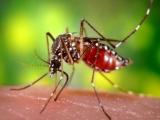As researchers today report positive early findings for a protein-based Zika vaccine, Florida officials confirm the state's first locally transmitted case in weeks, and a new study shows disease prevalence rates after the 2014-15 outbreak in French Polynesia.
Vaccine candidate performed well in preclinical trials
Protein Sciences announced promising results for its protein-based Zika vaccine in preclinical trials. The company said in a press release that it developed the vaccine in conjunction with the Brazilian Ministry of Health's Fiocruz Institute.
In April the vaccine will move into a phase 1 clinical trial in the United States. The company did not specify what type of animals were involved in vaccine testing, but said exposure to the purified protein elicited a strong immune response in them. The vaccine candidate also demonstrated strong safety data in a toxicology study sponsored by National Institute of Allergy and Infectious Disease.
Protein Sciences is the company behind the protein-based influenza vaccine, FluBlok. Its Zika vaccine candidate also uses a purified protein that matches a protein found on the outer surface of the Zika virus (the E protein).
New Florida, US Zika numbers
Florida Health, the state's department of health, confirmed a new case of locally transmitted Zika in Miami-Dade County yesterday. The individual reported visiting multiple sites throughout the county where exposure could have taken place.
Florida Health said that isolated cases of locally acquired Zika do not mean the state has active areas of Zika transmission. Active transmission ended in South Miami Beach on Dec 9, 2016.
There are now 257 locally acquired Zika cases recorded in Florida, and 1,026 travel-related cases. Nineteen cases have undetermined sites of transmission, and 210 pregnant women in the state have been diagnosed as having Zika virus infection.
In addition, the Centers for Disease Control and Prevention updated its weekly Zika numbers yesterday. There are now 4,866 cases of the mosquito-borne disease in the United States, only 31 more cases than last week. Of those cases, 4,649 are travel-related. There are now 35,415 cases reported in US territories, 394 more than last week.
The Pan American Health Organization (PAHO) released new Zika figures yesterday, as well. The number of countries and territories reporting the mosquito-borne virus remains at 48. Downward trends are reported in the Caribbean and North America. Only Panama and Peru reported increases.
Seroprevalence of Zika after an outbreak
Finally today, a study in Emerging Infectious Disease offers insight into the prevalence of Zika infection after a disease outbreak. French Polynesia first reported Zika cases in 2007, and during an outbreak between October 2013 and April 2014, approximately 11.5% of the population sought medical help for symptoms of the virus.
To assess the true prevalence of the viral disease, which is often asymptomatic, researchers tested several groups of people, including school children, who lived in French Polynesia immediate following the outbreak. Approximately 43% of the participants had Zika virus immunoglobulin G without self-reported symptoms. This number is much lower than 86%, which is what previous models predicted.
"These results suggest that infected persons did not consult medical care staff because the infection was mild or asymptomatic, as previously described," the authors said.
Two months after the outbreak, children under the age of 16 had a much higher seroprevalence than adults (66% compared with 22%).
See also:
Jan 13 Protein Sciences press release
Jan 12 Florida Health update
Jan 12 CDC Zika update
Jan 12 PAHO update
Jan 13 Emerg Infect Dis study






















